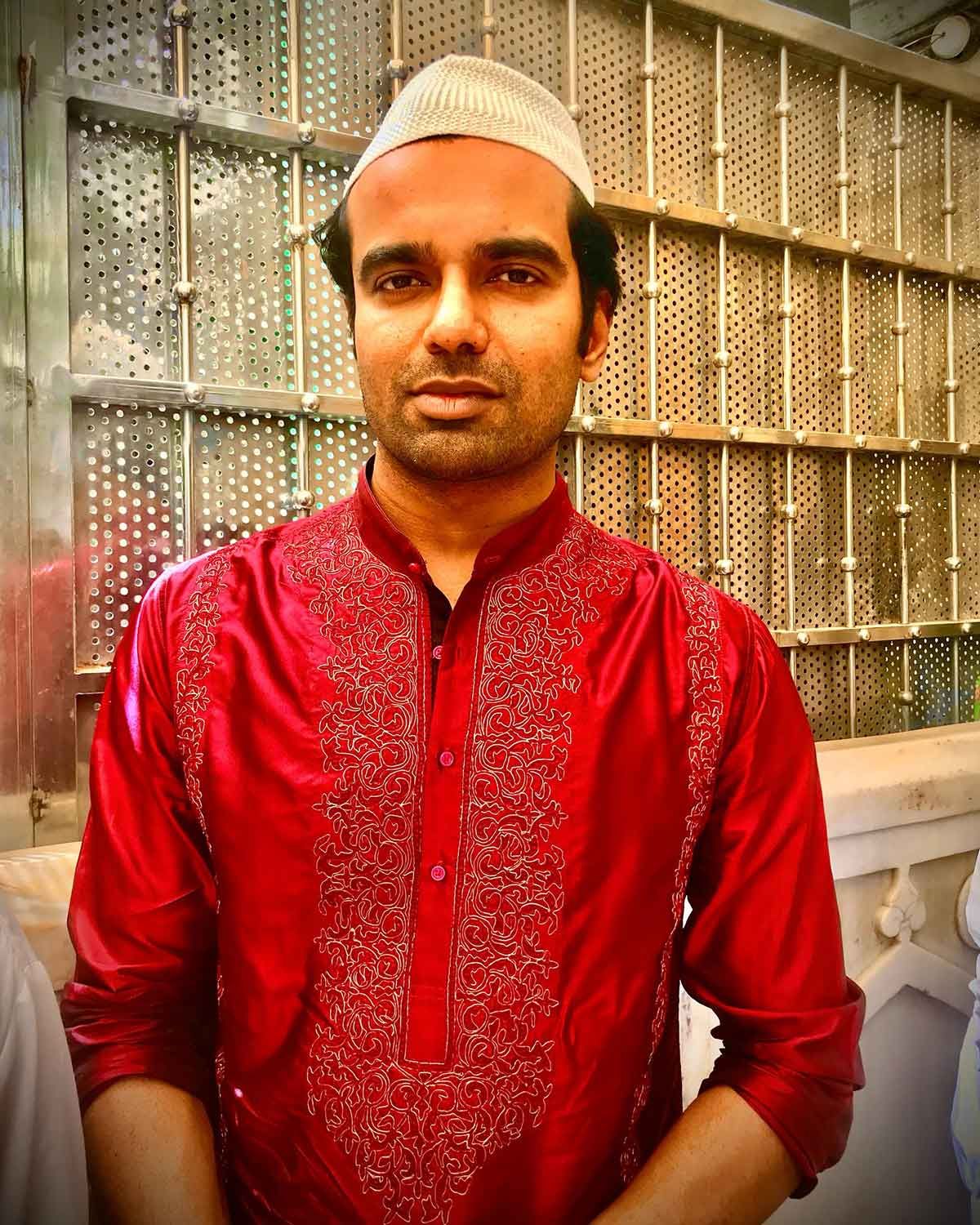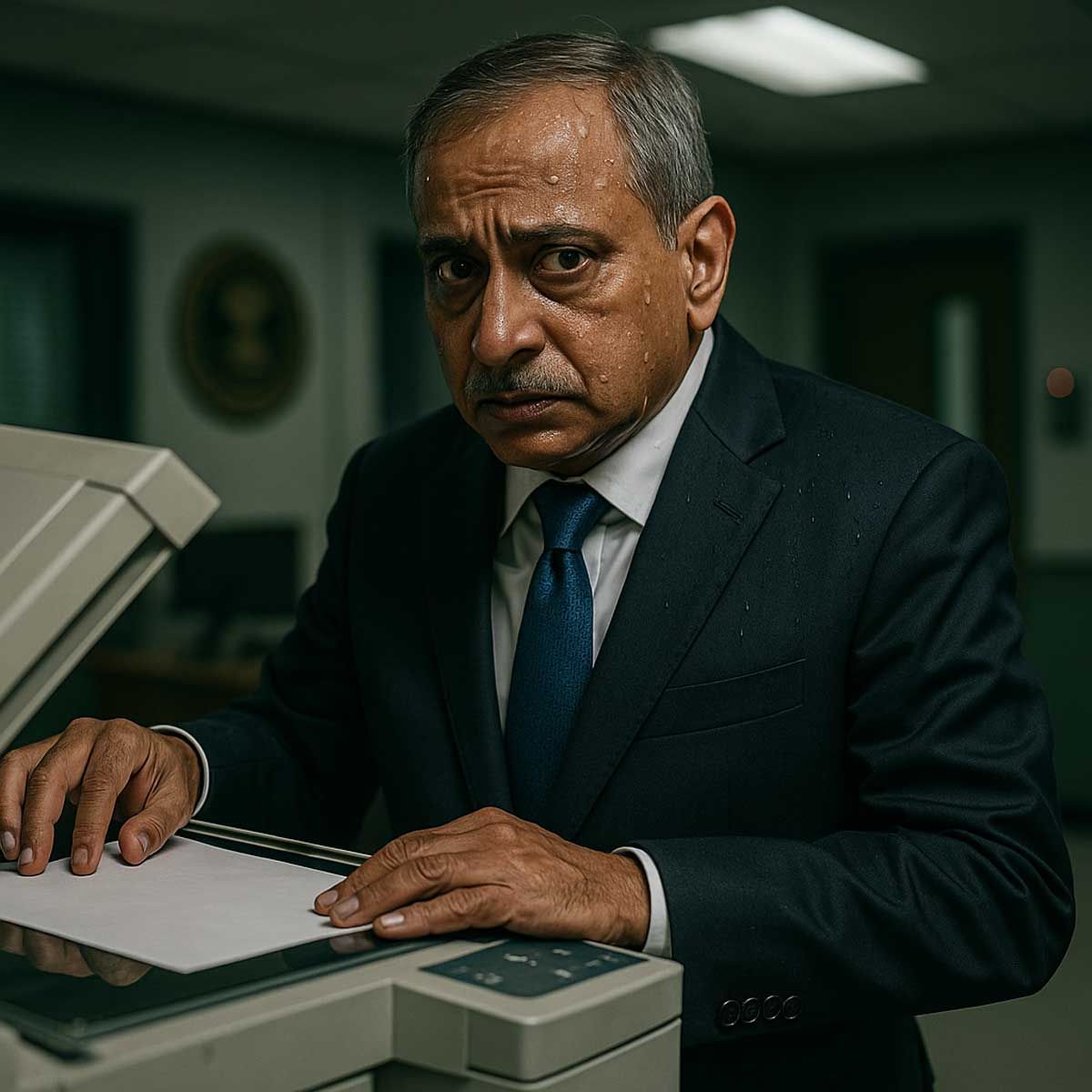More Coverage
Twitter Coverage
Satyaagrah
Written on
Satyaagrah
Written on
Satyaagrah
Written on
Satyaagrah
Written on
Satyaagrah
Written on
JOIN SATYAAGRAH SOCIAL MEDIA
After Puja Khedkar's alleged misuse of OBC and disability benefits, former IAS officer Abhishek Singh faces scrutiny as his dance and gym videos go viral, challenging his claimed 40% locomotor disability and casting doubt on UPSC's reservation integrity

The unfolding controversy raises questions about whether former IAS officer Abhishek Singh will face scrutiny and become a topic of national debate or if he will be absolved after thorough investigations. The outcome remains uncertain.
|
The case of Puja Khedkar, a trainee IAS officer from Pune accused of exploiting the Other Backward Class (OBC) quota and disability benefits for her appointment, has sparked similar scrutiny concerning Abhishek Singh. A member of the 2011 batch, Singh's position was also secured under the disabled category. However, recent dance and gym videos that have appeared on social media are now casting doubts on his qualification for the locomotor disability (LD) category.
According to an X user's claim, Singh's active social media presence led to his dismissal by the Uttar Pradesh government.
"Your name is Abhishek Singh. You got recruited in UPSC by submitting a certificate of locomotor disability. You were an IAS officer of the UP cadre. You were given the responsibility of General Observer by the Election Commission but were removed for showing off by uploading your photos on Instagram. You were famous for uploading reels and photos while working. You acted in Delhi Crime 2. You were suspended for being absent from work for 82 days. You then tried to contest elections and, after resigning, started PR and election preparations, but political parties did not support you. Now you are giving lectures on how to become an IAS officer and speaking on reservation issues," detailed @khurpenchh on X.
The controversy surrounding former IAS officer Abhishek Singh has escalated following recent social media revelations. Another user, @AdityaGoswami_, posted a video of Singh lifting weights in a gym and critically noted, "2010 batch IAS Abhishek Singh misused PwD quota by claiming that he has a locomotor disability (disability of bones, joints, or muscles due to which movement of the limbs becomes difficult). But, it can be clearly seen that he’s not suffering from any such disability.”
Further skepticism arose when @333maheshwariii shared a music video of Singh, openly questioning the authenticity of his disability claim. The user stated, "This is Abhishek Singh, who got an AIR 94 and claimed to have a locomotor disability. How does this guy look disabled? How is DoPT not verifying these claims? If this is true, it’s a huge downfall for UPSC!" These allegations raise serious concerns about the integrity of the reservation system and call for more rigorous checks by the Department of Personnel and Training (DoPT).
|
Know all about UPSC Reservation for physically handicapped candidates
The Union Public Service Commission (UPSC) provides specific reservations for physically handicapped candidates in the civil services exam, including other benefits like relaxation in age limits and the number of attempts permitted. This initiative underscores the UPSC's commitment to inclusivity, accommodating all aspirants with varying disabilities.
In the previous year, 2023, out of approximately 796 vacancies, 24 were designated for the physically handicapped (PH) category. The breakdown of these vacancies is as follows: Locomotor Disability and Cerebral Palsy (LDCP) had 8 vacancies, Blind/Low Vision (B/LV) had 3, Hearing Impaired (HI) had 9, and Multiple Disabilities accounted for 4, making a total of 24 PH vacancies.
The allegations against Abhishek Singh, if proven, could severely damage the credibility of the UPSC's reservation system, designed to ensure fair and equal opportunities for all candidates, particularly those with genuine disabilities.
Stringent Regulations for UPSC Candidates Claiming Disability Reservations
Candidates aiming to benefit from the reservation and special provisions for the physically handicapped (PH) category within the UPSC exams must adhere to strict guidelines to ensure the integrity of the process. Those seeking these allowances are reminded of the critical criteria they must meet:
- Eligibility is restricted to candidates with a disability of 40% or more.
- Applicants are required to furnish a Disability Certificate issued by a Medical Board authorized by either the Central or State government. This board must include at least three members, with one specializing in the candidate’s area of disability, whether locomotor, auditory, or visual.
- PH candidates must meet specific functional requirements for each service listed by the UPSC. Success in the UPSC Civil Services Exam (CSE) alone does not guarantee service allocation unless these functional criteria are satisfied.
- The Disability Certificate must be dated prior to the last application date for the UPSC prelims.
- Post-interview, a PH candidate undergoes a medical review by the Central Standing Medical Board (CSMB) at designated hospitals in Delhi, including Safdarjung Hospital, Dr. Ram Manohar Lohia Hospital (RML), Lady Hardinge Medical College (LHMC), Guru Teg Bahadur Hospital (GTB), and Lok Nayak Jai Prakash Narayan Hospital (LNJP).
- For those requiring specific eye condition assessments, the examination is conducted at the Guru Nanak Eye Centre in New Delhi.
- The CSMB issues a permanent disability certificate if the disability is confirmed as permanent. Candidates receive the medical examination details by post, and these can also be accessed on the UPSC website via a secure password within seven working days after the medical review.
- A candidate’s right to a disability certificate cannot be denied without an opportunity to be heard. The CSMB’s decisions are based on individual merit, and there is no fee for appealing its decision.
- Those who challenge the CSMB's findings may appeal to an Appellate Disability Medical Board appointed by the Department of Personnel and Training. Candidates must appear before this appellate board on the specified date, as failure to do so results in the CSMB’s decision being final. No further appeals can be made against the appellate board's judgment.
These stringent regulations underscore the seriousness with which the UPSC manages disability claims to prevent fraudulent activities like those allegedly committed by Abhishek Singh. His case, involving potential misuse of disability status, emphasizes the necessity for rigorous adherence to these protocols to maintain the sanctity and fairness of the UPSC examinations.
|
Understanding Locomotor Disability and mystic case of Abhishek Singh's Alleged Misuse of Reservations
Locomotor disability is a serious impairment that involves either cerebral palsy or conditions affecting bones, joints, or muscles, significantly limiting limb movement. Known also as mobility disability, these impairments can be either temporary or permanent and are generally evaluated based on the degree of functional impairment. An impairment, as defined, signifies any loss or deviation from normal in a physiological or anatomical structure or function.
Given this definition and the requirement that only candidates with a disability of 40% or more are eligible for reservation, the case of Abhishek Singh IAS raises significant doubts. Despite claiming such a disability, Singh's public activities—dancing, acting, and engaging in various physical activities typical of a fully able person—cast a shadow over his claim of having a 40% locomotor disability. His actions suggest a potential exploitation of the system meant to support those genuinely in need.
PH Category Reservation in UPSC: An Overview
The UPSC's reservation list for physically handicapped categories is dynamic, reflecting advancements in medical technology and potentially including new categories in the future. The list specifies various functional classifications and physical requirements:
- Communication (Partially Deaf)
- Reading and Writing (Low Vision)
- Blind
- Lifting (Both Legs One Arm)
- Kneeling and Crouching (Both Legs)
- Seeing (Visually Handicapped)
- Manipulation by Finger (One Leg)
- Walking (Both Legs)
- Bending (Both Legs and Arms)
- Hearing/Speaking (Hearing Handicapped)
- Standing (Muscular Weakness)
- Pushing and Pulling (One Arm One Leg)
Types of UPSC PWD Category
The UPSC recognizes Persons with Disabilities (PWD) and provides Persons with Benchmark Disabilities (PwBDs) reservations corresponding to the following categories:
- Low vision and Blindness
- Hard of hearing and Deaf
- Locomotor disability including leprosy cured, cerebral palsy, dwarfism, acid attack victims, and muscular dystrophy
- Autism, mental illness, specific learning disability, and intellectual disability
- Multiple disabilities from individuals under clauses (1) to (4), including deaf-blindness
For the year under consideration, the total number of vacancies reserved for PWD categories stands at 34, with the following breakdown:
- Hard of hearing and Deaf: 11
- Locomotor disability (including cerebral palsy, dwarfism, leprosy cured, muscular dystrophy, acid attack victims): 8
- Multiple Disabilities: 8
- Blind and Low Vision: 7
These classifications ensure that all candidates who genuinely meet these conditions have fair access to the opportunities provided by the UPSC, contrasting starkly with Abhishek Singh's alleged misuse of such a critical reservation, which if true, undermines the trust and fairness of the UPSC’s inclusive policies.
PWD Reservation in UPSC: A Detailed Overview
The UPSC, known for its rigorous and competitive selection process for various administrative positions in the country, provides specific reservations for Physically Handicapped or Persons with Benchmark Disabilities (PwBD). The overall vacancies last year stood at approximately 796, with 24 of these specially reserved for candidates under the PWD category. However, it is important to note that not all posts in the Civil Services are available to differently-abled aspirants due to the specific demands of certain positions.
|
PWD Quota in UPSC
The reservation for Physically Handicapped candidates in the UPSC is structured as follows:
- Maximum age limit for PwD candidates: 42 years
- Reservation percentage: 4% of total vacancies
- Number of attempts allowed: 9 for General/OBC/EWS candidates and unlimited for SC/ST
- Age Relaxation: 10 years
This framework is designed to accommodate the needs and challenges faced by differently-abled candidates, ensuring a level playing field for all aspirants.
Attempts Allowed for Physically Handicapped in UPSC
The flexibility in the number of attempts for PwBD candidates reflects the UPSC's commitment to inclusivity. The specific details for various categories are:
- PwBD - General: Minimum age 21 years, Maximum age 42 years, 9 attempts
- PwBD - OBC: Minimum age 21 years, Maximum age 45 years, 9 attempts
- PwBD - SC/ST: Minimum age 21 years, Maximum age 47 years, Unlimited attempts
These provisions ensure that PwBD candidates have ample opportunities to compete in this highly prestigious examination, which serves as the gateway to becoming IAS, IPS, IRS, IFS, and other high-ranking bureaucrats in India.
Understanding IAS Examination Accessibility for Physically Handicapped Candidates
The IAS examination, one of the most challenging tests for civil service aspirants in India, accommodates candidates with disabilities through specific cut-off scores and provisions.
IAS Prelims and Main Exam Cut-off for Physically Handicapped
The cut-off scores set for physically handicapped candidates vary, reflecting an understanding of the varied capabilities and challenges faced by these aspirants:
IAS Prelims 2022 Cut-off Scores:
- PwBD-1: 65-76
- PwBD-2: 48-58
- PwBD-3: 35-45
- PwBD-5: 47-58
Civil Services Main Exam 2021 Cut-off Scores (Out of 1750):
- PwBD-1: 668
- PwBD-2: 712
- PwBD-3: 388
- PwBD-5: 560
These cut-off scores are pivotal in ensuring that physically handicapped candidates who face significant life challenges are given a fair chance to succeed in the exams.
Clarification on PwBD-1 Category in UPSC
PwBD-1 in the UPSC context stands for Persons with Benchmark Disabilities related to blindness, locomotor disability (both arms affected), and cerebral palsy as defined under section 2(r) of the RPWD Act, 2016. This category receives reservations in line with the vacancies set by the government, ensuring fair access to civil service positions.
Extra Time Allocation for PwBD Candidates in UPSC Exams
Recognizing the additional challenges faced by candidates with disabilities, the UPSC grants compensatory time to PwBD candidates:
- 20 minutes per hour is allocated to candidates with disabilities such as blindness, locomotor disorders (both arms affected), and cerebral palsy during the UPSC examinations.
In light of these accommodations and considerations, the allegations against Abhishek Singh, who is accused of fraudulently claiming a disability, are particularly egregious. By potentially exploiting the system designed to support genuine candidates with disabilities, Singh's actions, if proven, could undermine the trust and integrity of these crucial provisions. Such behavior not only harms the individuals who rely on these accommodations but also casts a shadow over the competitive fairness of the UPSC examinations. It is essential for the UPSC to maintain stringent checks and balances to prevent abuse and ensure that only those truly eligible benefit from these necessary accommodations.
|
Abhishek Singh Responds to Allegations of Misusing Disability Reservation
In the midst of growing scrutiny over his eligibility under the disability quota, Abhishek Singh has publicly responded to the accusations via a detailed message on social media:
"Although I am not affected by any criticism, this is the first time I am answering my critics because my supporters asked me to. Since I started supporting reservations, anti-reservationists have targeted me. They question my caste and my job. Let me tell you, I have achieved everything through hard work and courage, not through reservation.
My father came from a poor background and became an IPS officer. I am the only one in my family to get selected for IAS. No domicile certificate is needed in UPSC, so stop the fake propaganda. I do what I feel is right and will continue to do so. Art and social service are my interests. I will continue working hard until I succeed.
I have done social work through my initiatives like United by Blood and the No-Shame Movement without government help. I believe that reservation in government jobs should be according to the population, and I will work towards that. If you think you have talent, stop trying for government jobs and excel in business, sports, or acting. There is no reservation there.
I move on the strength of my talent, confidence, and courage, not in anyone's favour."
Singh's response attempts to deflect the criticism by emphasizing his personal achievements and commitment to social causes, asserting that his career advancements were driven by merit and not facilitated by reservations. However, the veracity of his claim to a disability status, given the evidence of his physical activities, continues to cast doubt on his assertions.
As this controversy unfolds, it remains uncertain whether Singh will face further investigation or be exonerated by the authorities, mirroring the situation faced by Puja Khedkar. The resolution of this issue will likely be a subject of national media debate and could influence public perceptions of the reservation system and the integrity of those who benefit from it. Only time will tell how this matter will be conclusively addressed.
Controversies Surround IAS Officer Abhishek Singh's Resignation and 2023 Suspension
2011 batch IAS officer of the Uttar Pradesh cadre, Mr. Abhishek Singh, has recently resigned from service under controversial circumstances. His suspension earlier in February 2023 by the Yogi government came after it was discovered he had been absent from duty for a staggering 82 days without notification. This absence has sparked speculation about his future political ambitions, with rumors suggesting that Mr. Singh is eyeing a candidacy in the forthcoming Lok Sabha elections.
Adding to the complexity of his public and professional life, Mr. Singh's wife, Durga Shakti Nagpal, also an IAS officer from the 2010 batch, is currently serving as the DM of Banda district in Uttar Pradesh. Her high-profile career in administration contrasts starkly with the controversies surrounding her husband.
During the Gujarat elections, Mr. Singh was appointed as an observer by the Election Commission. He shared this role on his social media, posting a picture of the vehicle provided to him with "Observer" prominently displayed on the front. However, his tenure as an observer was cut short when, on November 18, 2023, the Election Commission, taking note of his public display and other concerns, issued a showcause notice to him and subsequently removed him from the position.
Despite previously stating in an interaction with Indian Masterminds that he would not leave the IAS, Mr. Singh's recent resignation raises serious questions about his commitment and integrity. Moreover, Mr. Singh's involvement in cultural activities like organizing a Ganesh Mahotsav in his hometown Jaunpur, which was attended by several film actors from Mumbai, alongside his roles in various video albums, indicates a blending of his administrative responsibilities with personal interests, potentially leading to conflicts of interest.
|
The Incident: Abhishek Singh's Controversial Career and Mismanagement
Mr. Abhishek Singh's tenure as an IAS officer has been marked by irregularities and questionable commitments. Initially sent on a deputation to the Delhi Government for three years in 2015, his deputation was extended in 2018. However, Singh took medical leave and subsequently failed to return, leading to his reassignment back to his parent cadre in Uttar Pradesh by the Delhi Government on March 19, 2020. Despite this directive, Singh delayed his return to Uttar Pradesh significantly.
The situation escalated when, on October 10, 2022, the appointment department reached out to Mr. Singh for his input, to which he failed to respond. Earlier, on June 30, 2022, he had agreed to join duties in UP, but he did not report to the recruitment department even after being released from his obligations in Delhi. This negligence was deemed a violation of Rule 3 of the All India Services Conduct Rules 1968, prompting the UP government to suspend him immediately and link his case to the Revenue Council.
About His Background: The IAS Officer Who Preferred the Spotlight
Abhishek Singh, originally from Jaunpur district of Uttar Pradesh, has a background in commerce with a degree from Delhi University. Before his selection into the IAS, he served as an ACP in Mumbai. However, it seems Singh's true passion lies not in public administration but in the limelight of the entertainment industry. He first came into the public eye after walking the ramp at Lakme Fashion Week and has since pursued a career in acting and music with notable enthusiasm.
Singh has appeared in B Praak’s music video ‘Dil Tod Ke’ and Jubin Nautiyal’s ‘Tujhe Bhoolna To Chaha…’. His role in the short film ‘Chaar Pandhrah’ and his recent performance in ‘Yaad Aati Hai’ further cement his interest in acting over his administrative duties. Rumors suggest that Singh's next role will be in the remake of the National Award-winning film ‘Shool’, where he is expected to play a police officer, ironically mirroring the roles he was meant to uphold in real life.
Through these endeavors, Singh has demonstrated a flair for drama and entertainment that arguably surpasses his commitment to his administrative responsibilities. His career trajectory suggests that perhaps his talents are better suited for the dramatic arts rather than the disciplined life of an IAS officer, making one wonder if his role in governance was merely a guest appearance in his ongoing acting career.
 Support Us
Support Us
Satyagraha was born from the heart of our land, with an undying aim to unveil the true essence of Bharat. It seeks to illuminate the hidden tales of our valiant freedom fighters and the rich chronicles that haven't yet sung their complete melody in the mainstream.
While platforms like NDTV and 'The Wire' effortlessly garner funds under the banner of safeguarding democracy, we at Satyagraha walk a different path. Our strength and resonance come from you. In this journey to weave a stronger Bharat, every little contribution amplifies our voice. Let's come together, contribute as you can, and champion the true spirit of our nation.
 |  |  |
| ICICI Bank of Satyaagrah | Razorpay Bank of Satyaagrah | PayPal Bank of Satyaagrah - For International Payments |
If all above doesn't work, then try the LINK below:
Please share the article on other platforms
DISCLAIMER: The author is solely responsible for the views expressed in this article. The author carries the responsibility for citing and/or licensing of images utilized within the text. The website also frequently uses non-commercial images for representational purposes only in line with the article. We are not responsible for the authenticity of such images. If some images have a copyright issue, we request the person/entity to contact us at This email address is being protected from spambots. You need JavaScript enabled to view it. and we will take the necessary actions to resolve the issue.
Related Articles
- "How’s the Josh": At 42, Amol Awate, a veteran turned IAS officer under the Muscular Dystrophy quota, defies expectations by swimming, playing basketball, and winning polo matches, sparking fierce debates over the elasticity of UPSC’s disability criteria
- "मैडम नखरेवाली": IAS trainee Pooja Khedkar, amidst controversies over fake disability and OBC claims on a 100 crore family wealth, dodged AIIMS medical tests six times and raised uproar with her unreasonable VIP demands at Pune Collector’s Office
- "गन्दा है पर धंधा है": Despite forging OBC & disability certificate for UPSC selection, fraud IAS Puja Khedkar enjoys endless court protection, dodging arrest while Delhi Police demand custody, UPSC bans her for life and reports expose her misuse of power
- "गरीबों की सुनो वो तुम्हारी सुनेगा": Neeti Agarwal secures a UPSC rank using the EWS quota, despite her father's lucrative tea enterprise and a lifestyle graced by celebrities, igniting widespread debate over the misuse of reservation policies in India
- Economics Offenses Wing booked 5 Methodist Church priests for financial fraud and encroaching government land in Madhya Pradesh: illegally constructed a building on the government land
- Operation Tupac is up and running by ISI of Pakistan in collaboration with Foreign-based organisations to lobby against India on global forums: Disinfo Lab report reveals Fascism, Genocide and Islamophobia used as a keyword
- "Honesty stands at the gate and knocks, and bribery enters in": Prashanth Kumar, chief accounts officer of Bangalore Water Supply & Sewerage Board arrested for ₹40 Lakh Bribe from office of Karnataka Soaps and Detergents Ltd, of brand Mysore Sandal Soap
- "Trust dies but mistrust blossoms": PowerPoint to Potatoes, why Bill Gates buying so much land, billionaire owns majority of US farmland, 895+ million acres of farmland in the country, so miraculously he actually has less than 1% of the country’s total
- "Wallah habibi": Thane arrest reveal Wazir Sheikh alias Yusuf Baba and six others trapping women with 'rain of money' promises, using compromising videos for blackmail, this scheme ensnared 17 innocent victims, unveiling a shocking exploitation network
- "If you see fraud and do not say fraud, you are a fraud": Systemic deficiency and the nexus between police, passport agents and passport officials come to light with Tamil Nadu BJP President K Annamalai going hammer and tongs about ‘Fake Passport Scam'
- "From dreams of upliftment to tales of deceit": India's colossal minority scholarship scam revealed: 53% of its beneficiaries unmasked as frauds, as aspirations turn to dust, the depth of the conspiracy stuns a nation, Smriti Irani initiates a CBI inquiry
- "Let the punishment be equal with the offence": Arrogant Monk Amogh Lila Das banned by ISKCON due to his controversial comments on Swami Vivekananda and Ramakrishna Paramhansa, to remain secluded from public life on Govardhan hills for one month
- "Indifference and neglect often do much more damage than outright dislike": BharatPe seeks Rs 88 crore in damages from Ashneer Grover and family; requested court to restrain Grover from continuing his 'vitriolic campaign' against company on social media
- King Uthram Thirunal Marthanda Varma of Travancore presented Ivory Throne and a stool as a gift objects to Queen Victoria, become an integral part of Queen's interiors
- Christian teacher asked the students to recite Christian prayers while she abused Hindu deities, ‘Bhagwat Gita is evil, read Bible’: Tailoring teacher in Tamil Nadu forces students to follow Christianity, suspended




























